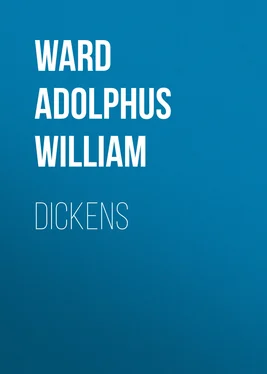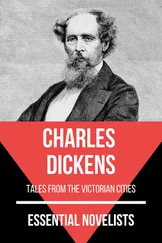Adolphus Ward - Dickens
Здесь есть возможность читать онлайн «Adolphus Ward - Dickens» — ознакомительный отрывок электронной книги совершенно бесплатно, а после прочтения отрывка купить полную версию. В некоторых случаях можно слушать аудио, скачать через торрент в формате fb2 и присутствует краткое содержание. Жанр: Биографии и Мемуары, foreign_antique, на английском языке. Описание произведения, (предисловие) а так же отзывы посетителей доступны на портале библиотеки ЛибКат.
- Название:Dickens
- Автор:
- Жанр:
- Год:неизвестен
- ISBN:нет данных
- Рейтинг книги:5 / 5. Голосов: 1
-
Избранное:Добавить в избранное
- Отзывы:
-
Ваша оценка:
- 100
- 1
- 2
- 3
- 4
- 5
Dickens: краткое содержание, описание и аннотация
Предлагаем к чтению аннотацию, описание, краткое содержание или предисловие (зависит от того, что написал сам автор книги «Dickens»). Если вы не нашли необходимую информацию о книге — напишите в комментариях, мы постараемся отыскать её.
Dickens — читать онлайн ознакомительный отрывок
Ниже представлен текст книги, разбитый по страницам. Система сохранения места последней прочитанной страницы, позволяет с удобством читать онлайн бесплатно книгу «Dickens», без необходимости каждый раз заново искать на чём Вы остановились. Поставьте закладку, и сможете в любой момент перейти на страницу, на которой закончили чтение.
Интервал:
Закладка:
After two or three years of such work and play it became necessary for Charles Dickens once more to think of earning his bread. His father, who had probably lost his official post at the time when, in Mr. Micawber’s phrase, “hope sunk beneath the horizon,” was now seeking employment as a parliamentary reporter, and must have rejoiced when a Gray’s Inn solicitor of his acquaintance, attracted by the bright, clever looks of his son, took the lad into his office as a clerk at a modest weekly salary. His office associates here were perhaps a grade or two above those of the blacking warehouse; but his danger now lay rather in the direction of the vulgarity which he afterwards depicted in such samples of the profession as Mr. Guppy and Mr. Jobling. He is said to have frequented, in company with a fellow-clerk, one of the minor theatres, and even occasionally to have acted there; and assuredly it must have been personal knowledge which suggested the curiously savage description of Private Theatres in the Sketches by Boz , the all but solitary unkindly reference to theatrical amusements in his works. But whatever his experiences of this kind may have been, he passed unscathed through them; and during the year and a half of his clerkship picked up sufficient knowledge of the technicalities of the law to be able to assail its enormities without falling into rudimentary errors about it, and sufficient knowledge of lawyers and lawyers’ men to fill a whole chamber in his gallery of characters.
Oddly enough, it was, after all, the example of the father that led the son into the line of life from which he was easily to pass into the career where success and fame awaited him. The elder Dickens having obtained employment as a parliamentary reporter for the Morning Herald , his son, who was living with him in Bentinck Street, Manchester Square, resolved to essay the same laborious craft. He was by this time nearly seventeen years of age, and already we notice in him what were to remain, through life, two of his most marked characteristics—strength of will, and a determination, if he did a thing at all, to do it thoroughly. The art of short-hand, which he now resolutely set himself to master, was in those days no easy study, though, possibly, in looking back upon his first efforts, David Copperfield overestimated the difficulties which he had conquered with the help of love and Traddles. But Dickens, whose education no Dr. Strong had completed, perceived that in order to succeed as a reporter of the highest class he needed something besides the knowledge of short-hand. In a word, he lacked reading; and this deficiency he set himself to supply as best he could by a constant attendance at the British Museum. Those critics who have dwelt on the fact that the reading of Dickens was neither very great nor very extensive, have insisted on what is not less true than obvious; but he had this one quality of the true lover of reading, that he never professed a familiarity with that of which he knew little or nothing. He continued his visits to the Museum, even when in 1828 he had become a reporter in Doctors’ Commons. With this occupation he had to remain as content as he could for nearly two years. Once more David Copperfield, the double of Charles Dickens in his youth, will rise to the memory of every one of his readers. For not only was his soul seized with a weariness of Consistory, Arches, Delegates, and the rest of it, to which he afterwards gave elaborate expression in his story, but his heart was full of its first love. In later days he was not of opinion that he had loved particularly wisely; but how well he had loved is known to every one who after him has lost his heart to Dora. Nothing came of the fancy, and in course of time he had composure enough to visit the lady who had been its object in the company of his wife. He found that Jip was stuffed as well as dead, and that Dora had faded into Flora; for it was as such that, not very chivalrously, he could bring himself to describe her, for the second time, in Little Dorrit .
Before at last he was engaged as a reporter on a newspaper, he had, and not for a moment only, thought of turning aside to another profession. It was the profession to which—uncommercially—he was attached during so great a part of his life, that when he afterwards created for himself a stage of his own, he seemed to be but following an irresistible fascination. His best friend described him to me as “a born actor;” and who needs to be told that the world falls into two divisions only—those whose place is before the foot-lights, and those whose place is behind them? His love of acting was stronger than himself; and I doubt whether he ever saw a play successfully performed without longing to be in and of it. “Assumption,” he wrote in after days to Lord Lytton, “has charms for me—I hardly know for how many wild reasons—so delightful that I feel a loss of, oh! I can’t say what exquisite foolery, when I lose a chance of being some one in voice, etc., not at all like myself.” He loved the theatre and everything which savoured of histrionics with an intensity not even to be imagined by those who have never felt a touch of the same passion. He had that “belief in a play” which he so pleasantly described as one of the characteristics of his life-long friend, the great painter, Clarkson Stanfield. And he had that unextinguishable interest in both actors and acting which makes a little separate world of the “quality.” One of the staunchest friendships of his life was that with the foremost English tragedian of his age, Macready; one of the delights of his last years was his intimacy with another well-known actor, the late Mr. Fechter. No performer, however, was so obscure or so feeble as to be outside the pale of his sympathy. His books teem with kindly likenesses of all manner of entertainers and entertainments—from Mr. Vincent Crummles and the more or less legitimate drama, down to Mr. Sleary’s horse-riding and Mrs. Jarley’s wax-work. He has a friendly feeling for Chops the dwarf, and for Pickleson the giant; and in his own quiet Broadstairs he cannot help tumultuously applauding a young lady “who goes into the den of ferocious lions, tigers, leopards, etc., and pretends to go to sleep upon the principal lion, upon which a rustic keeper, who speaks through his nose, exclaims, ‘Behold the abazid power of woobad!’” He was unable to sit through a forlorn performance at a wretched country theatre without longing to add a sovereign to the four-and-ninepence which he had made out in the house when he entered, and which “had warmed up in the course of the evening to twelve shillings;” and in Bow Street, near his office, he was beset by appeals such as that of an aged and greasy suitor for an engagement as Pantaloon: “Mr. Dickens, you know our profession, sir—no one knows it better, sir—there is no right feeling in it. I was Harlequin on your own circuit, sir, for five-and-thirty years, and was displaced by a boy, sir!—a boy!” Nor did his disposition change when he crossed the seas; the streets he first sees in the United States remind him irresistibly of the set-scene in a London pantomime; and at Verona his interest is divided between Romeo and Juliet and the vestiges of an equestrian troupe in the amphitheatre.
What success Dickens might have achieved as an actor it is hardly to the present purpose to inquire. A word will be said below of the success he achieved as an amateur actor and manager, and in his more than half-dramatic readings. But, the influence of early associations and personal feelings apart, it would seem that the artists of the stage whom he most admired were not those of the highest type. He was subdued by the genius of Frédéric Lemaître, but blind and deaf to that of Ristori. “Sound melodrama and farce” were the dramatic species which he affected, and in which as a professional actor he might have excelled. His intensity might have gone for much in the one, and his versatility and volubility for more in the other; and in both, as indeed in any kind of play or part, his thoroughness, which extended itself to every detail of performance or make-up, must have stood him in excellent stead. As it was, he was preserved for literature. But he had carefully prepared himself for his intended venture, and when he sought an engagement at Covent Garden, a preliminary interview with the manager was postponed only on account of the illness of the applicant.
Читать дальшеИнтервал:
Закладка:
Похожие книги на «Dickens»
Представляем Вашему вниманию похожие книги на «Dickens» списком для выбора. Мы отобрали схожую по названию и смыслу литературу в надежде предоставить читателям больше вариантов отыскать новые, интересные, ещё непрочитанные произведения.
Обсуждение, отзывы о книге «Dickens» и просто собственные мнения читателей. Оставьте ваши комментарии, напишите, что Вы думаете о произведении, его смысле или главных героях. Укажите что конкретно понравилось, а что нет, и почему Вы так считаете.












